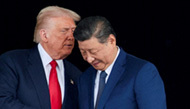Huang Kexue, federal authorities say, is a new kind of spy. For five years, Mr. Huang was a scientist at a Dow Chemical lab in Indiana, studying ways to improve insecticides. But before he was fired in 2008, Mr. Huang began sharing Dow’s secrets with Chinese researchers, authorities say, then obtained grants from a staterun foundation in China with the goal of starting a rival business there.
Now, Mr. Huang, who was born in China and is a legal United States resident, faces a rare criminal charge ? that he engaged in economic espionage on China’s behalf. Law enforcement officials say the kind of spying Mr. Huang is accused of represents a new front in the battle for a global economic edge. As China and other countries broaden their efforts to obtain Western technology, American industries beyond the traditional military and high-tech targets risk having valuable secrets exposed by their own employees, court records show.
Prosecutors say it is difficult to prove links to a foreign government, but intelligence officials say China, Russia and Iran are among the countries pushing hardest to obtain the latest technologies. “In the new global economy, our businesses are increasingly targets for theft,” said Lanny A. Breuer, the assistant attorney general in charge of the Justice Department’s criminal division. “In order to stay a leader in innovation, we’ve got to protect these trade secrets.”
Mr. Huang, 45, who says he is not guilty, is being prosecuted under an economic espionage provision in use for only the seventh time. Created by the United States Congress in 1996 to address a shift toward industrial spying after the cold war, the law makes it a crime to steal business trade secrets, like software code and laboratory breakthroughs.
The crime rises to espionage if the thefts are carried out to help a foreign government. Economic espionage charges are also pending against Jin Hanjuan, a software engineer for Motorola who was arrested with a laptop full of company documents while boarding a plane for China, prosecutors said. Scientists at the DuPont Company and Valspar, a Minnesota paint company, recently pleaded guilty to stealing their employers’ secrets after taking jobs in China.
American officials and corporate trade groups say they fear economic spying will increase as China’s quest for Western know-how spreads from military systems to everyday commercial technologies.
But security analysts say some American companies must share the blame for thefts because they do not adequately monitor employees. Catching and prosecuting wrongdoers is also made difficult by the refusal of some companies to report breaches.
“When you have public companies with their stock values tied to their assets, the last thing they want the buyer of that stock to think is that their assets are compromised,” said Michael Maloof, the chief technology officer of TriGeo Network Security, a company that provides computer monitoring systems. Spies Pilfer Trade Secrets Globally
Sarah Chen contributed research
스마터리빙
more [ 건강]
[ 건강]이제 혈관 건강도 챙기자!
[현대해운]우리 눈에 보이지 않기 때문에 혈관 건강을 챙기는 것은 결코 쉽지 않은데요. 여러분은 혈관 건강을 유지하기 위해 어떤 노력을 하시나요?
 [ 건강]
[ 건강]내 몸이 건강해지는 과일궁합
 [ 라이프]
[ 라이프]벌레야 물럿거라! 천연 해충제 만들기
 [ 건강]
[ 건강]혈압 낮추는데 좋은 식품
[현대해운]혈관 건강은 주로 노화가 진행되면서 지켜야 할 문제라고 인식되어 왔습니다. 최근 생활 패턴과 식생활의 변화로 혈관의 노화 진행이 빨라지고
사람·사람들
more많이 본 기사
- 뉴욕·북유럽에 눈폭풍…잇단 항공편 결항에 교통대란
- 佛배우 브리지트 바르도 별세…생전 韓보신탕 문화 비판
- 초유의 ‘3특검’ 활동 종료…헌정사 첫 전직 대통령부부 동반기소
- 이혜훈 “韓경제 ‘회색코뿔소’ 상황…미래안목 기획·예산 연동”
- 李대통령, 12·29 참사에 “대통령으로서 사죄…유가족 종합지원”
- 트럼프, 4주년 앞둔 우크라전 終戰불씨 살리나…진전·한계 병존
- 中, 9개월만에 ‘대만포위’ 훈련… “외곽차단 등 실전능력 검증”
- ‘정계은퇴선언’ 펠로시 “중간선거서 민주당이 하원 다수당 될것”
- 고금리·고가격·관세 ‘브레이크’… 신차 시장 썰렁
- 트럼프 “돈바스 일부 의견접근”…젤렌스키 “안전보장 거의 합의”
- 美서 스마트폰 ‘부모통제’ 기능으로 납치 청소년 구조
- 정용진 신세계그룹 회장 “비상할 준비 마쳐…내년 성장할 것”
- 李대통령, 오늘 청와대 첫 출근… ‘용산 시대’와 결별
- 北, 장거리순항미사일 발사…김정은 “핵무력 무한대 발전 총력”
- 韓, 이번주 안보리 이사국 2년 임기종료…외교지평 확대 평가
- 정석원, ♥백지영과 수입 격차 언급하더니.. “전역 반지까지 팔아”
- 시니어들 상황별 리버스모기지의 선택
- 뉴저지서 헬기 2대 공중 충돌… “최소 1명 사망”
- “13초만에 수백만 달러 매출” 방탄소년단 뷔 3분 라이브 방송이 만든 크리스마스의 기적
- 삼보일배·108배…집회도 대통령 따라 다시 청와대 앞으로
- ‘180일 질주’ 김건희특검 수사결과 발표…20명 구속·66명 기소
- 국힘, 이혜훈 발탁에 최고위 열어 ‘제명’… “배신” 비난 쏟아져
- ‘친형 구속’ 박수홍, 그 다음은 ‘198억 손해배상’
- 뉴욕에 3년만에 최대 폭설…이틀째 항공·도로 대란
- ‘마이큐♥’ 김나영, 재혼 두달 만에 큰 결심.. “한부모 가정에 1억원 기부”
- ‘정신건강 위험’ 비판받은 오픈AI, AI 안전 책임자 다시 모집
- “케데헌이 없애준 장벽… “ WSJ ‘미국인 사로잡은 K팝’ 조명
- 충격 진단 “네이마르 이미 끝났다, 몸 심각하게 손상”... ‘식단 문제·훈련 부족’ 지적 “월드컵? 너무 늦었다”
- ‘이강달’ 강태오, 로코 달인은 다르다.. “김세정도 눈빛 좋다고”
- ‘파친코’ 이민진 작가 “맘다니 뉴욕시장, 긍정적 변화 기대”
- 트럼프 “종전협상 마지막 단계”…젤렌스키 “신속한 평화 오길”
- 중도보수 중량급 인사 중용…李대통령 ‘실용주의 용인술’ 재부각
- 마지막 토요일도 도심 집회… “내란 … 6
- 태국-캄보디아, ‘101명 사망’ 교전 20일만에 휴전
- “지금은 하늘에... 아빠가 뛰던 곳이란다” 故 조타 아들 둘, 반 다이크 ‘손 꼭 붙잡고’ 안필드 찾았다
- “개인 선정은 SON이 유일?” 손흥민, 축구계 8대 기적 선정이 더 대단한 이유 “퀴라소 월드컵 진출보다 멋져”
- 이이경·조세호 다 떠나고..유재석 곁엔 결국 ‘무도’ 인연이었다
- ‘AI 조작 번복’ 폭로자 vs ‘유재석 패싱’ 이이경..하차 잔혹사로 번진 사생활 논란 [2025 연말결산]
- 트럼프, 젤렌스키와 회동 앞서 “푸틴과 생산적인 통화했다”
- 쿠팡 김범석, 30~31일(한국시간) 연석청문회 또 불출석 의사… “일정 있어”
- 180일간 김건희만 판 특검 오늘 수사 종료…’V0’ 단죄 성과
- 올해 美 기업 파산신청 증가… “관세·고물가·고금리 원인”
- “내년 미중관계 4대 화약고는 대만·콩·수출통제·군사굴기”
- 러시아 “대만해협 긴장 고조시 중국 지지…대만은 中 일부”
- 캐나다, 우크라에 18억달러대 추가 재정 지원키로
- IS 확실했나…트럼프 ‘성탄절 나이지… 1
- 트럼프, 태국-캄보디아 휴전에 “미국이 기여…유엔, 도움안돼”
- 여야, ‘통일교·종합 특검’ 정면충돌… 2
- 젤렌스키 미국행… “레드라인 있지만 타협점 찾을 수 있어”
- “올해 최고 주목받은 테크 거물은 머스크 아닌 래리 엘리슨”
1/5지식톡

-
 미 육군 사관학교 West Poin…
0
미 육군 사관학교 West Poin…
0https://youtu.be/SxD8cEhNV6Q연락처:wpkapca@gmail.comJohn Choi: 714-716-6414West Point 합격증을 받으셨나요?미 육군사관학교 West Point 학부모 모…
-
 ☝️해외에서도 가능한 한국어 선생님…
0
☝️해외에서도 가능한 한국어 선생님…
0이 영상 하나면 충분합니다!♥️상담신청문의♥️☝️ 문의 폭주로 '선착순 상담'만 진행합니다.☎️ : 02-6213-9094✨카카오톡ID : @GOODEDU77 (@골뱅이 꼭 붙여주셔야합니다…
-
 테슬라 자동차 시트커버 장착
0
테슬라 자동차 시트커버 장착
0테슬라 시트커버, 사놓고 아직 못 씌우셨죠?장착이 생각보다 쉽지 않습니다.20년 경력 전문가에게 맡기세요 — 깔끔하고 딱 맞게 장착해드립니다!장착비용:앞좌석: $40뒷좌석: $60앞·뒷좌석 …
-
 식당용 부탄가스
0
식당용 부탄가스
0식당용 부탄가스 홀세일 합니다 로스앤젤레스 다운타운 픽업 가능 안녕 하세요?강아지 & 고양이 모든 애완동물 / 반려동물 식품 & 모든 애완동물/반려동물 관련 제품들 전문적으로 홀세일/취급하는 회사 입니다 100% …
-
 ACSL 국제 컴퓨터 과학 대회, …
0
ACSL 국제 컴퓨터 과학 대회, …
0웹사이트 : www.eduspot.co.kr 카카오톡 상담하기 : https://pf.kakao.com/_BEQWxb블로그 : https://blog.naver.com/eduspotmain안녕하세요, 에듀스팟입니다…
케이타운 1번가
오늘의 1면
오피니언

새해 더 중요해지는 노동법 준수

연말연시, 안전하고 차분하게
 캐슬린 파커 워싱턴포스트 칼럼니스트
캐슬린 파커 워싱턴포스트 칼럼니스트 [캐슬린 파커 칼럼] 지미 라이의 마지막 희망
 유경재 나성북부교회 담임목사
유경재 나성북부교회 담임목사 [한국춘추] 미국의 힘
 전병두 서북미수필가협회 회원
전병두 서북미수필가협회 회원 [금요단상] 비자 발급
 박일근 / 한국일보 수석논설위원
박일근 / 한국일보 수석논설위원 [지평선] 스님의 주례사
 신상철 / 고려대 고고미술사학과 교수
신상철 / 고려대 고고미술사학과 교수 [미술 다시보기] 신의 모습을 닮고자 한 예술가
 스티브 강 전 한인민주당협회 회장
스티브 강 전 한인민주당협회 회장 [스티브 강 ‘인사이드 미국’] 2026 중간선거: 트럼프 지지율 하락이 말해주는 것
 김홍일 케이유니콘인베스트먼트 대표
김홍일 케이유니콘인베스트먼트 대표 [기고] 안정의 기준은 어떻게 제도가 되었나
1/3지사별 뉴스

물류거점창고에 불체자 8만명 수용 추진
도널드 트럼프 행정부가 이민자 구금·추방을 효율화하기 위해 전국 물류거점 창고에 8만명 규모의 수용시설 확보를 추진한다고 24일 워싱턴 포스트…
‘학자금 상환’ 안하면 임금압류

“온 세상에 희망·평화의 빛 스며들길”
가자지구와 우크라이나에서의 전쟁, 고립과 불평등으로 세상이 어지러운 가운데 워싱턴 지역 각급 한인교회와 성당들이 성탄절을 맞아 일제히 예배와 …
“연말은 스트레스·새해 결심은 없다”

“올해 최고 주목받은 테크 거물은 머스크 아닌 래리 엘리슨”
올해 미국에서 가장 주목받은 기술업계 거물은 일론 머스크 테슬라 최고경영자(CEO)가 아닌 래리 엘리슨 오라클 창업자·회장이라고 블룸버그 통신…
[새해부터 이렇게 달라진다] 최저임금 또 오르고… 유급 병가는 더 확대

오늘 하루 이 창 열지 않음 닫기 





















































.png)


댓글 안에 당신의 성숙함도 담아 주세요.
'오늘의 한마디'는 기사에 대하여 자신의 생각을 말하고 남의 생각을 들으며 서로 다양한 의견을 나누는 공간입니다. 그러나 간혹 불건전한 내용을 올리시는 분들이 계셔서 건전한 인터넷문화 정착을 위해 아래와 같은 운영원칙을 적용합니다.
자체 모니터링을 통해 아래에 해당하는 내용이 포함된 댓글이 발견되면 예고없이 삭제 조치를 하겠습니다.
불건전한 댓글을 올리거나, 이름에 비속어 및 상대방의 불쾌감을 주는 단어를 사용, 유명인 또는 특정 일반인을 사칭하는 경우 이용에 대한 차단 제재를 받을 수 있습니다. 차단될 경우, 일주일간 댓글을 달수 없게 됩니다.
명예훼손, 개인정보 유출, 욕설 등 법률에 위반되는 댓글은 관계 법령에 의거 민형사상 처벌을 받을 수 있으니 이용에 주의를 부탁드립니다.
Close
x